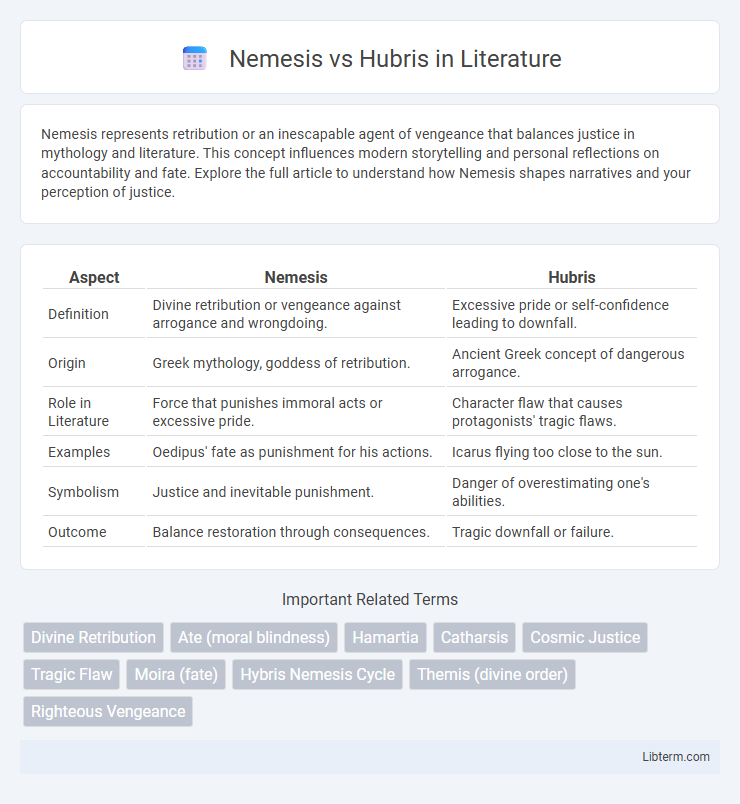Nemesis represents retribution or an inescapable agent of vengeance that balances justice in mythology and literature. This concept influences modern storytelling and personal reflections on accountability and fate. Explore the full article to understand how Nemesis shapes narratives and your perception of justice.
Table of Comparison
| Aspect | Nemesis | Hubris |
|---|---|---|
| Definition | Divine retribution or vengeance against arrogance and wrongdoing. | Excessive pride or self-confidence leading to downfall. |
| Origin | Greek mythology, goddess of retribution. | Ancient Greek concept of dangerous arrogance. |
| Role in Literature | Force that punishes immoral acts or excessive pride. | Character flaw that causes protagonists' tragic flaws. |
| Examples | Oedipus' fate as punishment for his actions. | Icarus flying too close to the sun. |
| Symbolism | Justice and inevitable punishment. | Danger of overestimating one's abilities. |
| Outcome | Balance restoration through consequences. | Tragic downfall or failure. |
Understanding Nemesis and Hubris: Definitions
Nemesis represents retributive justice or inevitable punishment for excessive pride, while hubris refers to excessive self-confidence or arrogance that defies moral or divine laws. Understanding nemesis requires recognizing it as the natural consequence of hubris's overstepping limits and moral boundaries. These concepts, rooted in Greek tragedy and philosophy, illustrate the balance between human ambition and ethical restraint.
Historical Origins of Nemesis and Hubris
Nemesis and hubris originate from ancient Greek mythology, where Nemesis was the goddess of retribution who ensured justice by punishing excessive pride and arrogance, known as hubris. Hubris referred to the dangerous overconfidence or arrogance that often led to a character's downfall, reflecting moral lessons in classical Greek literature. The historical significance of Nemesis lies in her role as the divine balance against the destructive consequences of hubris within Greek cultural narratives.
Nemesis in Mythology and Literature
Nemesis in mythology represents the goddess of retribution and divine justice, ensuring that excessive pride, or hubris, is punished to restore moral balance. Literature frequently portrays Nemesis as the inevitable force that brings downfall to characters whose arrogance blinds them to their limitations. This archetype underscores the theme that unchecked hubris invites Nemesis's retribution, emphasizing the consequences of violating natural or divine laws.
Hubris as a Fatal Flaw
Hubris, characterized by excessive pride and arrogance, acts as a fatal flaw that inevitably provokes Nemesis, the goddess of retribution. In Greek tragedy, characters who exhibit hubris challenge divine order and human limitations, leading to their downfall as Nemesis ensures balance through punishment. This interplay underscores the moral lesson that unchecked ego and defiance of fate invite inevitable ruin.
Nemesis vs Hubris: Key Differences
Nemesis represents divine retribution against excessive pride or hubris, serving as a moral force that restores balance by punishing arrogance. Hubris, characterized by overconfidence and disrespect toward the gods or natural order, often leads individuals to ignore limits and ethical boundaries. The key difference lies in Nemesis being the consequence or corrective agent for hubris, emphasizing justice versus the destructive arrogance inherent in hubris.
Psychological Perspectives on Hubris
Hubris, characterized by excessive pride and overconfidence, is often linked to cognitive distortions such as narcissism and inflated self-esteem in psychological research. Psychologists identify hubris as a maladaptive trait that impairs judgment and decision-making, potentially leading to catastrophic consequences due to the underestimation of risks. Understanding hubris through cognitive-behavioral frameworks provides insight into its role in personal and organizational downfall, highlighting the importance of self-awareness and humility in psychological well-being.
Real-World Examples of Nemesis and Hubris
Nemesis and hubris often manifest in real-world scenarios where leaders or organizations face downfall due to excessive pride or arrogance. Examples include the 2008 financial crisis, where excessive risk-taking by banks exemplified hubris, leading to nemesis through economic collapse and regulatory backlash. Similarly, historic figures like Napoleon Bonaparte demonstrate nemesis as their overreaching ambition (hubris) ultimately caused military defeats and exile.
The Consequences of Hubris: Enter Nemesis
Hubris, characterized by excessive pride and arrogance, often leads to reckless decisions and moral blindness. The consequences of hubris manifest through Nemesis, the personification of divine retribution, which restores balance by punishing overweening pride. This inevitable downfall underscores the ancient Greek belief in maintaining humility to avoid catastrophic consequences.
Lessons from Nemesis and Hubris in Modern Society
Nemesis and Hubris provide crucial lessons in modern society about the dangers of excessive pride and the importance of balance and humility. Hubris, characterized by overconfidence and arrogance, often leads to downfall, while Nemesis represents the inevitable retribution or consequences that follow such behavior. Recognizing these dynamics helps individuals and organizations avoid reckless decisions, fostering ethical leadership and sustainable success.
Preventing Hubris: Embracing Humility
Preventing hubris requires embracing humility as a core value, encouraging self-awareness and the recognition of one's limitations. Nemesis, representing retribution against excessive pride, serves as a cautionary figure reminding individuals and leaders to maintain balance and avoid arrogance. Cultivating humility fosters ethical decision-making and resilience, reducing the risk of downfall caused by overconfidence.
Nemesis Infographic

 libterm.com
libterm.com